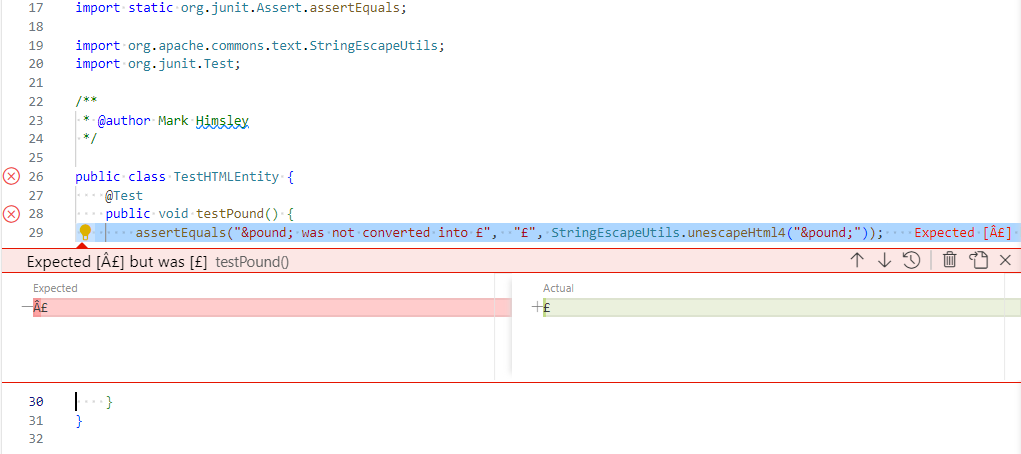UTF-8 Character Encoding in Java on Windows
The problem
Below I will use a common library which converts HTML entities into their UTF-8 character, and I will create a unit test to confirm that the library is doing the correct job.
I am only going to focus on the HTML entity £, which should be converted into the character £.
I’m going to use Microsoft Visual Studio Code running on Windows to edit the source code.
I have created a simple project in VSCode on Windows, and ensured that I am saving the source files as UTF-8 with LF only line endings - just as I might on other platforms.

The code in TestHTMLEntity.java is very simple - just one assert in a test which is using a method in Apache’s commons-text library to test the conversion of the HTML entity into its character representation.
import static org.junit.Assert.assertEquals;
import org.apache.commons.text.StringEscapeUtils;
import org.junit.Test;
public class TestHTMLEntity {
@Test
public void testPound() {
assertEquals("£ was not converted into £", "£", StringEscapeUtils.unescapeHtml4("£"));
}
}
There is a simple gradle.build file to collect the dependencies and select Java 8. Note that this venerable version of Java is not going to cause the problem I’m observing.
plugins {
id 'application'
}
repositories {
mavenLocal()
mavenCentral()
}
java {
toolchain {
languageVersion.set(JavaLanguageVersion.of(8))
}
}
wrapper {
distributionType = Wrapper.DistributionType.ALL
gradleVersion = '8.4'
}
dependencies {
implementation("org.apache.commons:commons-text:1.10.0")
testImplementation("junit:junit:4.12")
}
If I run the test in VSCode it fails - which is unexpected.

Looking carefully at the text in the “Actual” column you can see that the conversion from the HTML entity £ to the character £ worked. The failure is because the text in the “Expected” is the two characters £ not the single £ character that I had in the source code.
Why the two characters £ ?
In the Windows Code Page 1252 the  character is composed of the hex byte 0xc2, and the £ character is composed of the hex byte0xa3.
In UTF-8 £ character is composed of two hex bytes 0xc2 0xa3 - the same hex bytes as the two characters £ in Windows Code Page 1252.
On Windows, the Java compiler assumes Java source code text is encoded using Windows Code Page 1252
The Java compiler javac has assumed that: since it is compiling on Windows, the source code will be in Windows Code Page 1252. But VSCode is saving the source code in UTF-8.
How to fix it
There are several simple ways to fix this problem. Only one of them is the correct fix.
Save the source file in Windows Code Page 1252
Implementing this bad fix would be terrible for any collaborators working on devices other than Windows - and useless if you had pulled the code from a Git repository where all of the files are stored in UTF-8.
Change the source code
Implementing this bad fix would result in you having to use unicode entities in your source code - using \u00A3 instead of the £ character in the source code.
@Test
public void testPound() {
assertEquals("£ was not converted into \u00A3", "\u00A3", StringEscapeUtils.unescapeHtml4("£"));
}
I should hope that it’s clear why changing your source code so that every UTF-8 character that is not directly mapped into the Windows Code Page 1252 is written as its unicode entity is a bad thing.
Configure Gradle
The correct fix is to tell Gradle to tell the Java Compiler javac to ignore it’s assumption that the source code is in Windows Code Page 1252, and instead tell the Java Compiler javac that the source code is in UTF-8.
The documentation for javac includes this section:
-encoding encoding
Sets the source file encoding name, such as EUC-JP and UTF-8. If the
-encodingoption is not specified, then the platform default converter is used.
To add the option -encoding UTF-8 to the javac command line I will add this small section into the build.gradle file:
tasks.withType(JavaCompile) {
options.encoding = 'UTF-8'
}
Saving the build.gradle file and re-running the test that failed, it now passes.
